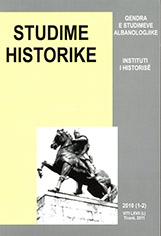Konflikti shqiptaro-sovjetik në optikën e fqinjëve të Shqipërisë
The Soviet-Albanian conflict as seen by Albania's nearby countries
Author(s): Hamit KabaSubject(s): History
Published by: Qendra e Studimeve Albanologjike
Keywords: Soviet-Albanian conflict ; Albania's nearby countries; Albania; Albanian History;
Summary/Abstract: The Soviet - Albanian crisis of 1960 - 1961 created a difficult and delicate situation for Albania. The Albanian leadership found itself in front of several dilemmas that included the existence of the Communist regime and the country's national security. Albania's nearby countries, Yugoslavia, Greece and Italy showed a really active behavior concerning the situation that was created. However, their politics towards Albania were not symmetrical in their objectives and in their way of expression and execution. They did not propose the alternative of dividing between them the Albanian territory, as they had done before. Even their positions concerning the Communist regime in Albania, the possibilities of dethroning, maintaining or modifying this regime, were different. Italy, Greece and Yugoslavia, just as they had done before, were implicated in a "conflict of interests" showing their doubts openly and observing one - another with distrust. Italy and Greece, two member countries of NATO, have often addressed their options to the State Department, NATO etc. Inside the neighboring triangle, the politics of Tito's Yugoslavia were seen with a greater doubt by the Albanian leadership itself, the two neighboring countries, and even by the United States and the Occident in general. The danger that the Yugoslavian state represented for Albania had its source on the bad relations between the two countries' leaderships, the improved Soviet -Yugoslavian rapports and the "free hands" policy that Yugoslavia had adopted, as a state that was engaged in none of the two greatest blocs of the time - NATO and the Treaty of Warsaw. However, leaving aside the dilemmas of the time, the Albanian leadership remained Stalinist until the end. It was anchored behind Mao Zedung's China. The country's continuity was also assisted by the unchanging rapports between East and West under the Cold War, during which "crossing the fences" was almost impossible. The Hungarian example in 1956 had been a clear indicator in that direction.
Journal: Studime Historike
- Issue Year: 2010
- Issue No: 01-02
- Page Range: 167-185
- Page Count: 19
- Language: Albanian
- Content File-PDF

